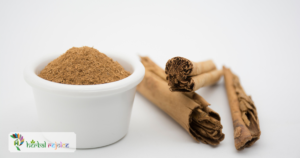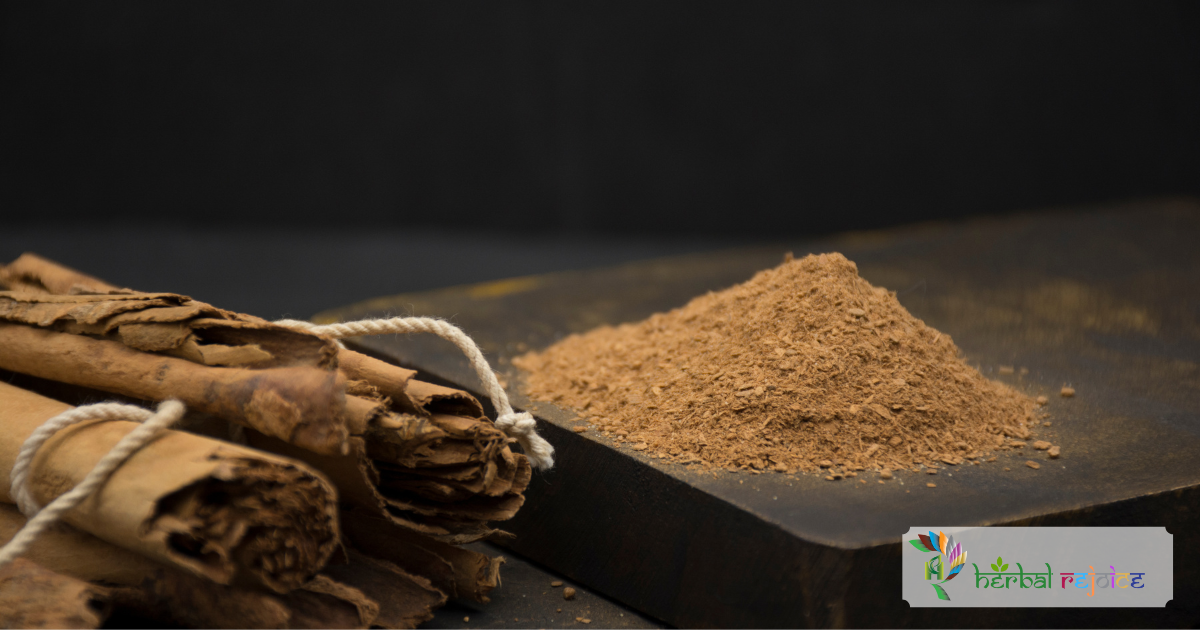Introduction To Cinnamon
Cinnamomum zeylanicum, also known as Ceylon Cinnamon, is a spice derived from the bark of the Cinnamomum zeylanicum tree, belonging to the Lauraceae family.
Cinnamon relieves flatulence, contracts tissues, relieves spasms, promotes mucus expulsion, stops bleeding, and prevents infection.
Cinnamon: A Rare Treat

Names and Habitat:
Cinnamomum zeylanicum, commonly known as Ceylon Cinnamon, belongs to the Lauraceae family.
It is primarily found in the Western Ghats region of India, with its cultivation concentrated in the state of Kerala.
Traditional Uses and Medicinal Benefits Of Cinnamon
Ceylon Cinnamon has a long history of traditional usage in various medicinal systems.
1. Bark:
Carminative, Astringent, Antispasmodic, Expectorant, Haemostatic, Antiseptic.
The bark of Ceylon Cinnamon is known for its diverse properties, including carminative (relieves flatulence), astringent (contracts tissues), antispasmodic (relieves spasms), expectorant (promotes mucus expulsion), haemostatic (stops bleeding), and antiseptic (prevents infection).
2. Leaf: Antidiabetic
Ceylon Cinnamon leaves are recognized for their potential antidiabetic effects, suggesting their usefulness in managing diabetes.
3. Ground Cinnamon:
Ground Cinnamon is commonly used to alleviate diarrhea, dysentery, stomach cramps, gastric irritation, nausea, and vomiting.
It can also be used externally for toothaches, neuralgia, and rheumatism.
Chemical Composition and Key Components Of Cinnamon
Ceylon Cinnamon contains several chemical compounds that contribute to its potential health benefits.
1. Cinnamaldehyde:
Cinnamaldehyde is the major constituent (74%) of the essential oil derived from Ceylon Cinnamon bark.
It has been found to exhibit hypotensive (lowers blood pressure) and spasmolytic (relaxes muscles) effects, increase blood flow, and inhibit enzymes associated with inflammation and pain.
2. Eugenol:
Ceylon Cinnamon leaf oil contains significant amounts of eugenol (28-98%), which possesses antiseptic and anesthetic properties.
However, it is important to note that the leaf oil should not be used interchangeably with the bark oil.
3. Other Compounds:
The root bark oil of Ceylon Cinnamon contains camphor and acts as a stimulant in amenorrhea (absence of menstrual periods).
The bark of the Ceylon Cinnamon tree contains tannins, diterpenes, and compounds like cinnzeylanin and cinnzeylanol, which contribute to its medicinal properties.
Potential Health Benefits Of Cinnamon
Ceylon Cinnamon and its components offer numerous potential health benefits.
1. Digestive Health:
Ceylon Cinnamon’s carminative and antispasmodic properties make it useful for promoting healthy digestion and relieving gastrointestinal discomfort, such as bloating and flatulence.
2. Blood Sugar Regulation:
The antidiabetic effects of Ceylon Cinnamon leaves suggest its potential use in managing blood sugar levels in individuals with diabetes. However, it should be used under professional guidance.
3. Anti-Inflammatory and Analgesic Effects:
Ceylon Cinnamon’s active compounds, such as cinnamaldehyde and eugenol, possess anti-inflammatory properties and may help alleviate pain and inflammation associated with conditions like arthritis and toothaches.
4. Antimicrobial Activity:
Ceylon Cinnamon bark oil and extracts demonstrate antibacterial, antifungal, and antiviral activities, making them potentially beneficial for combating various pathogens and supporting overall immune health.
Conclusion:
Cinnamomum zeylanicum, or Ceylon Cinnamon, holds tremendous potential for improving health and well-being. Its diverse range of properties, including carminative, antidiabetic, and antimicrobial effects, make it a valuable spice in traditional medicine.
Incorporating Ceylon Cinnamon into a balanced lifestyle may provide support for healthy digestion, blood sugar regulation, and immune function.
By embracing the unique properties and chemical composition of Cinnamomum zeylanicum, individuals can explore the remarkable health potential of Ceylon Cinnamon.
Frequently Asked Questions (FAQs):
What is the scientific name for Ceylon Cinnamon?
The scientific name for Ceylon Cinnamon is Cinnamomum zeylanicum.
Where is Ceylon Cinnamon primarily found?
Ceylon Cinnamon is primarily found in the Western Ghats region of India, with its cultivation concentrated in the state of Kerala.
What are the traditional medicinal uses of Ceylon Cinnamon?
Ceylon Cinnamon has traditionally been used for its carminative, astringent, antispasmodic, expectorant, haemostatic, and antiseptic properties.
What are the potential health benefits of Ceylon Cinnamon bark?
Ceylon Cinnamon bark may help with relieving flatulence, contracting tissues, relieving spasms, promoting mucus expulsion, stopping bleeding, and preventing infection.
Can Ceylon Cinnamon leaves help with diabetes?
Ceylon Cinnamon leaves are recognized for their potential antidiabetic effects, suggesting their usefulness in managing diabetes.
How can Ceylon Cinnamon be used for gastrointestinal issues?
Ceylon Cinnamon’s carminative and antispasmodic properties make it helpful for promoting healthy digestion and relieving gastrointestinal discomfort, such as bloating and flatulence.
Does Ceylon Cinnamon help regulate blood sugar levels?
Ceylon Cinnamon has shown potential for regulating blood sugar levels in individuals with diabetes.
Can Ceylon Cinnamon provide relief from inflammation and pain?
Ceylon Cinnamon’s active compounds, such as cinnamaldehyde and eugenol, possess anti-inflammatory properties and may help alleviate pain and inflammation associated with conditions like arthritis and toothaches.
How can Ceylon Cinnamon be incorporated into a diet?
Ceylon Cinnamon can be used as a spice in cooking or added to beverages and smoothies, providing flavor and potential health benefits.
Is there any scientific research supporting the benefits of Ceylon Cinnamon?
Ceylon Cinnamon has a history of traditional use, and there is ongoing scientific research to understand and validate its potential health benefits.
Is Ceylon Cinnamon safe for everyone to consume?
Ceylon Cinnamon is generally considered safe when used in culinary amounts. However, it is important to consult with healthcare professionals for individualized advice, especially for those with specific health concerns.
Can Ceylon Cinnamon be used in skincare or topical applications?
While Ceylon Cinnamon is primarily used as a spice and in traditional medicine, it is advisable to consult with skincare professionals for appropriate skincare recommendations.
Can Ceylon Cinnamon interact with medications?
Ceylon Cinnamon may interact with certain medications, especially those that affect blood sugar levels. It is crucial to consult with healthcare professionals if you are taking medications.
Where can I purchase Ceylon Cinnamon?
Ceylon Cinnamon is available in various forms, such as ground spice or capsules, and can be found in local grocery stores, health food stores, or online retailers.
Can Ceylon Cinnamon be used during pregnancy or breastfeeding?
It is best to seek specific guidance on the use of Ceylon Cinnamon during pregnancy or breastfeeding.
Is there a recommended dosage for Ceylon Cinnamon?
Dosage recommendations may vary depending on the individual’s health condition and specific needs.
Are there any known side effects of using Ceylon Cinnamon?
Ceylon Cinnamon is generally well-tolerated when used in culinary amounts. However, some individuals may experience allergic reactions or gastrointestinal discomfort. It is recommended to start with small amounts and monitor your body’s response.
Can Ceylon Cinnamon be used as a replacement for prescribed medication?
Ceylon Cinnamon should not be used as a replacement for prescribed medication. It can be used as a complementary approach.
Is Ceylon Cinnamon effective for weight loss?
While Ceylon Cinnamon has been studied for its potential effects on metabolism and blood sugar regulation. It is not a guaranteed solution and should be approached as part of a comprehensive weight management plan.





